Abstract
Recently, passive Radio Frequency Identification (RFID) systems have received an increased amount of attention as researchers have worked to implement a stable and reliable system. Unfortunately, despite vast improvements in the quality of RFID technology, a significant amount of erroneous data is still captured in the system. Currently, the problems associated with RFID have been addressed by cleaning algorithms to enhance the data quality. In this paper, we present X-CleLo, a means to intelligently clean and transform the dirty data into high-level events using Clausal Defeasible Logic. The extensive experimental study we have conducted has shown that the X-CleLo method has several advantages over currently utilised cleaning techniques and achieves a higher cleaning and event discovery rate.











Similar content being viewed by others
References
Derakhshan R, Orlowska ME, Li X (2007) RFID data management: challenges and opportunities. In: RFID 2007. pp 175 –182
Swedberg C (2005) Hospital uses RFID for surgical patients. RFID J. http://www.rfidjournal.com/article/articleview/1714/1/1/
Darcy P, Stantic B, Sattar A (2009) A fusion of data analysis and non-monotonic reasoning to restore missed RFID readings. In: Intelligent sensors, sensor networks and information processing (ISSNIP). pp 313–318
Darcy P, Stantic B, Sattar A (2010) Correcting missing data anomalies with clausal defeasible logic. In: advances in databases and information systems (ADBIS 2010). pp 149–163
Cocci R, Tran T, Diao Y, Shenoy PJ (2008) Efficient data interpretation and compression over RFID streams. In: ICDE. pp 1445–1447. IEEE
Wang F, Liu P (2005) Temporal management of RFID data. In: VLDB. pp 1128–1139
Darcy P, Stantic B, Mitrokotsa A, Sattar A (2010) Detecting intrusions within RFID systems through non-monotonic reasoning cleaning. In: Intelligent sensors, sensor networks and information processing (ISSNIP). pp 257–262
Floerkemeier C, Lampe M (2004) Issues with RFID usage in ubiquitous computing applications. In: Ferscha A, Mattern F (eds) Pervasive computing: second international conference, PERVASIVE 2004, 3001. Springer-Verlag, Linz/Vienna, Austria, pp 188–193
Jeffery SR, Garofalakis MN, Franklin MJ (2006) Adaptive cleaning for RFID data streams. In: VLDB. pp 163–174
Billington D (2008) Propositional clausal defeasible logic. In: European conference on logics in artificial intelligence (JELIA). pp 34–47
Billington D (2007) An introduction to clausal defeasible logic [online]. David Billington’s Home Page. http://www.cit.gu.edu.au/∼db/research.pdf
Golab L, Karloff H, Korn F, Srivastava D, Yu B (2008) On generating near-optimal tableaux for conditional functional dependencies. VLDB Endow 1(1):376–390
Wijsen J (2005) Database repairing using updates. ACM Trans Database Syst 30(3):722–768
Ré C, Letchner J, Balazinksa M, Suciu D (2008) Event queries on correlated probabilistic streams. In: SIGMOD ’08: proceedings of the 2008 ACM SIGMOD international conference on management of data. ACM, New York, NY, USA, pp 715–728
Tran T, Sutton C, Cocci R, Nie Y, Diao Y, Shenoy P (2009) Probabilistic inference over RFID streams in mobile environments. In: ICDE ’09: proceedings of the 2009 IEEE international conference on data engineering. IEEE Computer Society, Washington, DC, USA, pp 1096–1107
Xie J, Yang J, Chen Y, Wang H, Yu PS (2008) A sampling-based approach to information recovery. In: ICDE ’08: proceedings of the 2008 IEEE 24th international conference on data engineering. IEEE Computer Society, Washington, DC, USA, pp 476–485
Rao J, Doraiswamy S, Thakkar H, Colby LS (2006) A deferred cleansing method for RFID data analytics. In: VLDB. pp 175–186
Patterson DJ, Liao L, Fox D, Kautz HA (2003) Inferring high-level behavior from low-level sensors. In: Ubicomp. pp 73–89
Philipose M, Fishkin KP, Perkawitz M, Patterson DJ, Fox D, Kautz H, Hahnel D (2004) Inferring activities from interactions with objects. Pervasive Comput 10–17
Khoussainova N, Balazinska M, Suciu D (2008) PEEX: extracting probabilistic events from RFID data. In: In ICDE
Khoussainova N, Balazinska M, Suciu D (2007) Probabilistic RFID data management. UW CSE Technical Report UW-CSE-07-03-01
Wang F, Liu S, Liu P (2009) A temporal RFID data model for querying physical objects. Pervasive Mob Comput 6(3):382–397
Author information
Authors and Affiliations
Corresponding author
Rights and permissions
About this article
Cite this article
Darcy, P., Stantic, B. & Sattar, A. X-CleLo: intelligent deterministic RFID data and event transformer. Pers Ubiquit Comput 16, 259–269 (2012). https://doi.org/10.1007/s00779-011-0397-x
Received:
Accepted:
Published:
Issue Date:
DOI: https://doi.org/10.1007/s00779-011-0397-x




